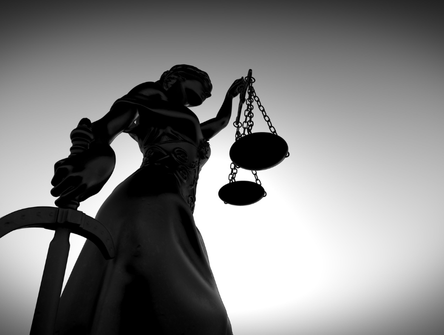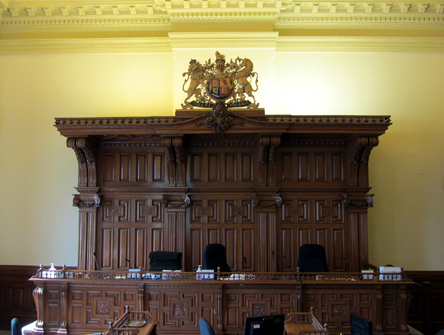The case of a Black judge accused of racial bias
In the season finale of Verdicts and Voices, historian Constance Backhouse discusses the RDS case, which shed much-needed light on systemic racism in policing, the courts, and the presumption of white judicial objectivity.

Most landmark Supreme Court cases are considered so because they establish a new legal principle or mark a significant change in the interpretation of the law.
However, the R v RDS case, which we revisit in the season finale of the Verdicts and Voices podcast, is a landmark because of how it affected our social legal history.
The 1997 case marked the first time the Supreme Court of Canada considered a complaint of judicial racial bias and is at the centre of legal historian and scholar Constance Backhouse’s 2022 book, Reckoning with Racism: Police, Judges, and the RDS Case.
Ironically, the judge who was accused of bias was Corrine Sparks, the country’s first Black female judge.
“There's no case that I can find that has ever been determined at the top level of the Supreme Court of Canada on racial bias of any judge, white or black,” Backhouse told host Alison Crawford.
“So, this is very unusual.”
It all started in 1993 when a white police officer pursuing a group of teenage boys in Halifax arrested one of them, a black teenager.
The boy’s cousin, Rodney Small, was riding his bike home from his grandma’s and saw the arrest happen.
“He shouted out his cousin's name, and he said, ‘Do you want me to call your mom?’” Backhouse explained.
The police officer told him to stop talking.
“Rodney, being full of bravado as only a 15-year-old boy can be, repeated, ‘Do you want me to call your mom?’ And went closer to the police officer.”
He was still straddling his bike, but he refused to stop trying to help his cousin.
“He wasn't trying to stop the arrest. He was just, as he put it in court later, being nosy. And he was quite worried. The police had a terrible reputation in the Black community in Nova Scotia,” Backhouse said.
“I think he was being a citizen observer.”
The police officer interpreted it differently and grabbed Small, put him in a chokehold, and then handcuffed him, along with his cousin. Small was charged with assaulting a police officer and obstructing arrest, and the case was sent to youth court. An unprecedented scene unfolded in the courtroom.
“For the first time, so far as I can determine across Canada, all of the authority figures in the courtroom were Black,” Backhouse said of Judge Sparks, the defence counsel, the court reporter, and the sheriff.
Only the prosecutor and the police officer who testified were white.
She said many people later admitted that this put them off centre.
“They were not used to being in a Black courtroom, and they were nervous about it, and that affected how the trial went,” Backhouse said.
“Which is very interesting, because we don't think often about the reverse, how does a Black lawyer or a Black accused person feel in an all-white courtroom? They've been feeling ill at ease for a very long time.”
After listening to the contradictory testimony — the white police officer said Small rammed his bicycle into him, while Small said he didn’t touch the officer — Judge Sparks issued an oral decision that the prosecutor had not proven the case beyond a reasonable doubt.
Small was acquitted, but that’s not what sparked outrage — what she said about the decision did. Sparks’ “famous words” were that the officer had overreacted in his arrest of Small, and that there was a pattern of white police overreacting when dealing with non-white youth.
“I think if she would have written it, had she had the time and the reflection to consider her words, she probably might not have said it,” Backhouse said of the time constraints of youth court.
The white police officer felt he had been unfairly targeted as a racist. The Crown attorney made complaints, and the case was appealed, with Sparks accused of an apprehension of bias.
The Supreme Court of Canada eventually heard the case. While the justices concluded that Small’s acquittal should not be overturned, Sparks was sharply criticized for saying there was a pattern of white police officers overreacting in their treatment of non-white youth.
Essentially, the Court said her comments were an embarrassment to herself and the justice system, Backhouse said.
“That was absolutely the worst thing they could have said, because unless we start talking about racism in our legal system, nobody's going to fix it.”
The outcry over her comments also had a devastating effect on the rest of Sparks’ legal career.
“I think she became, in some ways, a lightning rod, and … a symbol of courage to many people who are concerned about fairness in our law,” Backhouse said.
“She has also had a lot of champions, but in her personal life, her career was damaged.”
Tune in to hear more about what happened to Judge Sparks after the fallout from the case, and why Backhouse feels the outcome put much-needed light on the issues of systemic racism within policing, the courts, and the presumption of white judicial objectivity.
Also in the season finale, there is a timely look at whether Canada should withdraw from its Safe Third Country Agreement with the United States. On the lighter side, we also chat with lawyers who are part of the stand-up comedy scene.


